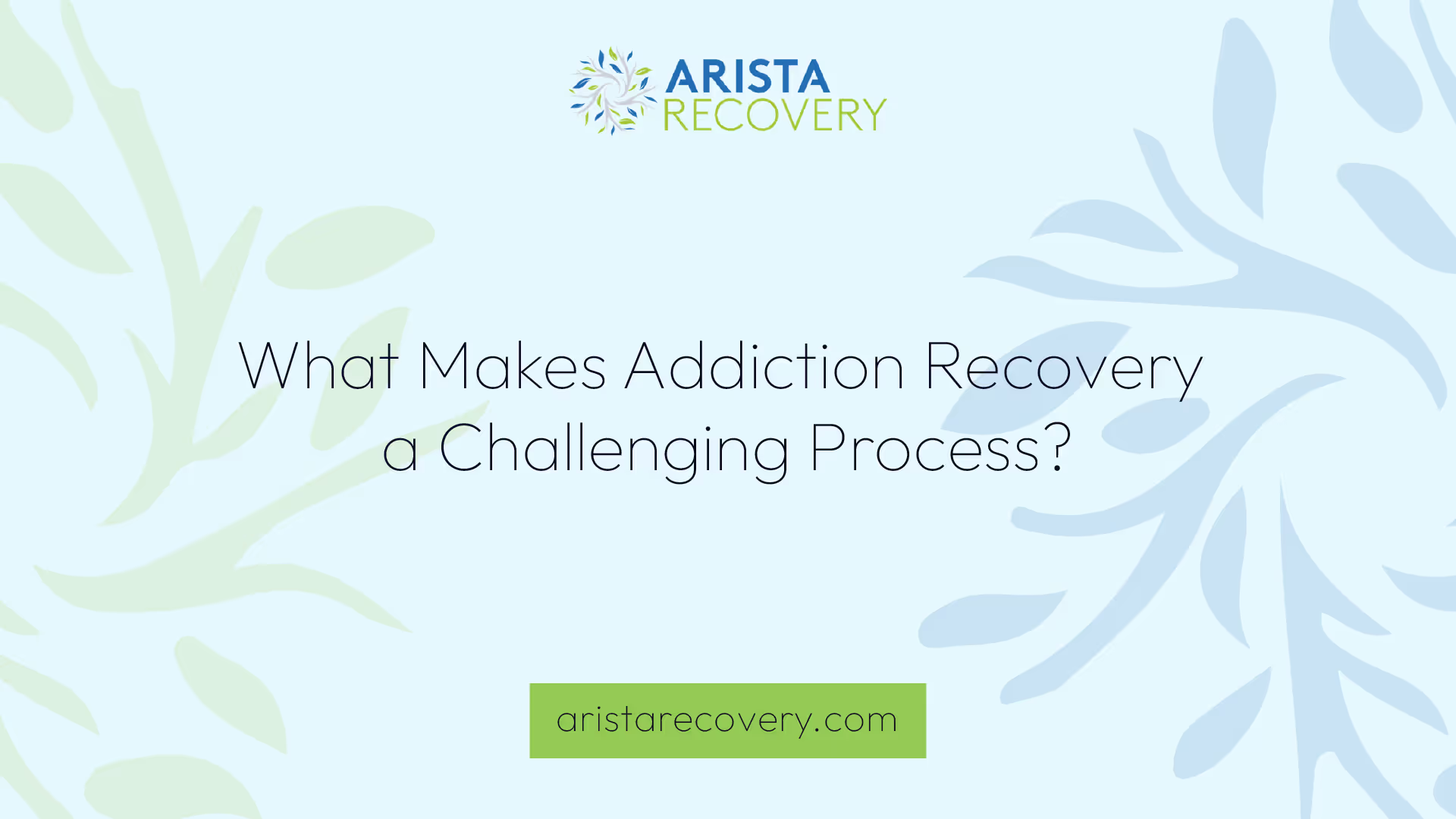
What Makes Addiction Recovery a Challenging Process?
Understanding Addiction Recovery Challenges
Getting through addiction recovery is tough. It's not just about quitting; it's about dealing with the brain's changes and the ups and downs of relapse.

Impact of Chronic Substance Use
Using drugs or alcohol for a long time messes with your brain. These changes stick around, making it easier to fall back into old habits even after you've stopped using American Addiction Centers.
This isn't about willpower or being strong. Your brain's been rewired, and that's why you need a solid, long-term plan to tackle these changes.
Stages of Relapse
Relapse isn't just one big event; it's a process with three stages: emotional, mental, and physical. First, you might feel emotionally unstable. Then, you start thinking about using again. Finally, you actually use the substance American Addiction Centers.
Relapse creeps up on you, and each stage has its own risks. The trick is to catch it early. Programs that involve family can really help, making it more likely you'll stick with treatment and fix relationships damaged by addiction NCBI.
Factors Contributing to Relapse
Knowing what can trigger a relapse is key. It could be anything from feeling down to being in a place where you used to use.
Risk Factors for Relapse
Relapse usually starts with emotional instability, then mental preoccupation, and finally, physical use [1]. The more triggers you have, the higher the chance of relapse. It often begins with a tough situation and a poor response, leading to a lapse and then a full-blown relapse.
Importance of Self-Efficacy
Believing you can handle triggers and cravings is crucial. Recognizing what sets you off and learning how to cope can boost your confidence and help you stay sober.
Cognitive therapy is great for changing negative thoughts and building healthy coping skills. It's proven to help prevent relapse [2].
Mental Health in Addiction Recovery
Mental health is a big part of addiction recovery. Many people with addiction also have mental health issues. Treating both at the same time is crucial.
Dual Diagnosis Importance
"Dual diagnosis" means having both a substance use disorder and a mental health issue. Conditions like depression, anxiety, PTSD, and ADHD often go hand-in-hand with addiction [3].
Ignoring mental health can mess up recovery. Untreated mental health issues can trigger relapses, so treating both is essential for long-term success.
Role of Cognitive-Behavioral Therapy
Cognitive-behavioral therapy (CBT) is super helpful, especially for those with dual diagnoses. It helps change negative thinking patterns and develop new coping mechanisms, reducing reliance on substances and managing mental health symptoms [4].
Incorporating mental health care into addiction recovery is vital. This includes a healthy lifestyle, regular check-ups, and strong connections with friends and family.
Addressing Co-Occurring Conditions
Dealing with both addiction and mental health issues is crucial. This means recognizing and treating any mental health conditions alongside addiction.
Supportive Housing Benefits
Supportive housing provides a safe environment where you can focus on recovery without triggers. It often includes on-site mental health services, offering consistent care for co-occurring conditions.
Supportive housing, detox, rehab programs, and regular attendance at support groups can significantly improve long-term recovery [4].
Embracing Healthy Connections
Healthy connections are vital. Friends and family can provide emotional support, accountability, and motivation.
"Healthy connections" also include relationships with healthcare providers, mental health professionals, and support groups. These connections offer guidance, support, and resources throughout recovery.
Addressing co-occurring conditions highlights the multifaceted nature of recovery. Treating mental illnesses like depression, anxiety, PTSD, and ADHD can help tackle the addiction crisis that claims over 100,000 lives annually [3].
Environmental Influence on Addiction
Environmental factors play a big role in addiction recovery.
Impact of Social Determinants
Factors like low socioeconomic status, homelessness, and incarceration can make recovery harder by limiting access to resources and support.
Exposure to substances and environmental toxicants can also increase the risk of addiction. Proximity to alcohol and tobacco outlets is linked to higher rates of use and related issues.
Cultural Values and Substance Use
Cultural values influence substance use. For example, among Hispanic adolescents, values like familism and respeto have varying impacts on substance use. Familism is linked to higher marijuana use, while respeto is associated with lower use of alcohol, marijuana, and cigarettes. Machismo can be a risk factor for males but a protective factor for females [5].
Children in homes with prevalent substance use or those who have experienced trauma are at higher risk of developing substance use issues. Traumatic experiences can lead to brain changes associated with substance use disorders and mental health issues.
Changing Public Perception
Societal perceptions and stigma play a big role in addiction recovery.
Media Influence on Stigma
Media often portrays people with mental illness as violent, promoting negative stereotypes and stigma. This makes it harder for individuals to seek help and recover.
Stigma against children and adolescents is generally lower than for adults, but it varies with social distance. Many believe treatment would result in discrimination and long-term negative effects on a child's future [7].
Combating Stigma through Education
Education is key to combating stigma and promoting supportive attitudes towards people in recovery. Positive trends show that stigma associated with mental health treatment is decreasing, and support for treatment-seeking is increasing.
Increased awareness and understanding can foster a more supportive environment for individuals navigating addiction recovery.
References
[1]: https://americanaddictioncenters.org/treat-drug-relapse
[2]: https://www.ncbi.nlm.nih.gov/pmc/articles/PMC4553654/
[3]: https://nida.nih.gov/about-nida/noras-blog/2022/09/addiction-often-goes-hand-in-hand-other-mental-illnesses-both-must-be-addressed
[4]: https://bhoperehab.com/importance-of-mental-health-for-addiction-recovery/
When mental health challenges and addiction intersect, it can feel isolating. At Arista, we offer compassionate, evidence-based, and trauma-informed care to help you heal, grow, and move forward.
You’re not alone in this.
When mental health challenges and addiction intersect, it can feel isolating. At Arista, we offer compassionate, evidence-based, and trauma-informed care to help you heal, grow, and move forward.
Support that moves with you.
You’ve taken a brave first step. At Arista Recovery, we’re here to help you continue with best-in-class care designed for long-term healing and support.
.webp)






